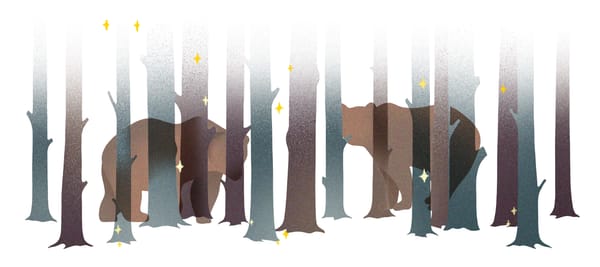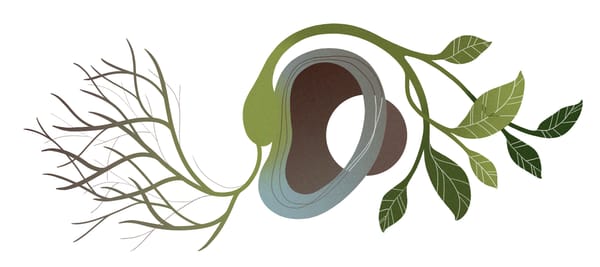Address
by Sharla Yates | How much kindness do we owe to strangers?

It took me a moment to register what the elderly couple, standing at my front door, was asking.
“You knew Wayne, yes?” Somehow, the question—coming from these two well-kept, manicured people, their dusty RV parked in our driveway, heat rising from the tires—made me unsure. The woman had a frizzy perm, and I could see her pale scalp through her ginger-blonde hair. “We’re his parents. This was the last address he gave. Said he was living with a family?”
“For about three weeks. He just kind of left one day.”
Wayne’s father wore a fisherman’s hat that shaded his eyes, but his mouth seemed kind. He lifted his clean-shaven chin like he was trying to figure something out.
I wondered whether they’d heard about me, the teenager who didn’t want the middle-aged homeless man living in her house.
~~~
My father said Wayne never found work because of his water-stained tennis shoes. They had the aroma of BO and mildewed dishrags. My father bought him another pair for interviews, with wing tips and shiny leather—or they would have been shiny, if they weren’t secondhand.
“How can you be sure he’s looking for work?” I said.
My father gave me a sideways glance, a warning that I was butting into things that were none of my business.
~~~
My father told two significant stories about his life. He was raised on the rocky cliffs of the Oregon coast on a dairy farm, under the rules of feast or famine, jump and do, don’t ask to be told, the thick-belt-threat of his father’s unpredictable temper. Later, he faced his fear of death in Vietnam, came home with a bad back, a poor leg, and only half his large intestines. These two stories explained why he was in constant pain. How his faith kept him steady.
He woke up at five every morning for devotions, taught living science and history at a Christian school, and frequently brought people home. One at a time came the wayward teenage girls who attended youth group but had problems at home; a man whose drinking had led his wife to kick him to the curb, but whose repentance earned him a bed in our spare room; and a family, found living in a van, that ended up staying for a year in our garage. Wayne, my father found panhandling under the freeway overpass a block from our house. He was a small man with gray hair and a wide face. He probably looked older than he actually was.
More than once my father told me he, too, could have chosen violence over prayer, beer over church, ladies over marriage. It’s the seesaw of right and wrong we all teeter on. He figured that if he taught me right, I’d be saved in the ways that matter.
“I don’t worry about your safety,” he said. “You’re a big girl . . . sturdy.”
True. I wasn’t the type of girl who was easy to bend and use. I was the chef’s knife: quick to cut, to chop, could clear the room with one word. Still, Wayne became my daily annoyance. Not so much for what he said—Wayne said very little—but for the fact I could no longer move through my house unobserved.
Once, he caught me lip-synching, holding my hairbrush as a microphone in front of the hallway mirror. I jumped in surprise at his sudden presence, and he scuttled off to the next room, down a path he had worn from the refrigerator to the couch and out the back door.
I asked my mother, “What do we know about him? Is Wayne even his name?”
“He has a family,” she said. “They live in Nevada.”
“Kids?”
“Two.” She pushed her large glasses up the bridge of her nose. “Boys.”
“So, he left his kids.”
“May be things got hard? He’s ex-military.”
~~~
After Wayne moved in, I was reluctant to come home after school since it would be just the two of us at the house. One afternoon, I stood at the corner of Finlay Avenue. To my right was home; to my left was a walking trail that led to a baseball field where a picnic table sat with a view of the river. I fingered a half-smoked cigarette in my pocket. I had at least half an hour before anyone would miss me.
I pulled my feet up on the picnic table and dragged the cigarette slowly, relishing the taste, releasing a cloud above my head. The park was empty.
I leaned back on my elbows and spotted Wayne. The shoes my father had bought him were tied together by their strings and slung over his shoulder. On his feet were his old tennis shoes. He was carrying my dad’s fishing pole. We locked eyes. I snubbed the cigarette out on the table, but it was too late: we had already seen the truth in each other. Wayne continued walking as if we were strangers. I watched him disappear around the bend without ever looking back.
~~~
Earlier that year, after my brother moved away, my parents had offered my cousin and her one-year-old daughter a place to stay. With arms crossed, she watched as her daughter climbed Wayne’s lap and handed him the TV remote. Wayne smiled, revealing a silver tooth. My cousin gathered her daughter, and I followed them to their bedroom. In the privacy allowed by a closed door, she whispered a litany of complaints, pointing out my parents’ negligence. Of course, she couldn’t complain to them; it would be ungracious. She was also living with us out of charity.
“What if he’s some sort of pervert?” she hissed.
~~~
The next day, I asked my father that question as if it had occurred to me out of nowhere.
The globe printed on his T-shirt stretched over his large belly. I remember thinking that was funny, but how mentioning it would lessen the urgency I was trying to convey. I explained how my cousin felt uncomfortable with Wayne playing with her daughter—more evidence that I wasn’t making something out of nothing.
“Do you think he would tell us?” I asked. “Because that’s not how it works.”
My father regarded me with pity before leaving me standing alone, my hands clenched by my sides.
“You shouldn’t have said anything,” my mother said after learning that Wayne left during the night. “He had his pride.”
~~~
And now Wayne’s mother and father were here, on my doorstep.
“He was murdered,” his father explained. “We just came from his funeral in Seattle.”
“He was asleep under a bridge and some kids dropped cement on his head,” his mother said. “Crushed him. Part of a gang initiation or something.”
I thought about the envelope I had hidden in my dresser, a letter that arrived the day after Wayne left. It was addressed to Wayne Morton Jr. I hadn’t known his full name, but then I did, and there was power in that. I’d kept the letter just in case Wayne ever returned, though I suspect I’d known he never would.
I didn’t mention the letter to his parents.
~~~
When my mother got back home later, I met her at the car. I told her about Wayne’s parents, the news of his death.
She grasped my arm, digging her nails into me. “It’s our fault,” she said. I knew she meant it was my fault.
“I don’t feel bad about it,” I lied, and then meant it.
As she entered the house, leaving the door open behind her, I stood in the driveway facing out toward the tail of the neighborhood, where the freeway overpass blocked the horizon. Inside the house, my baby cousin laughed. I thought of dinner and television, of Wayne’s placid gaze. How easy, to leave one day and never look back.
Sharla Yates is the author of the poetry chapbook What I Would Say if We Were to Drown Tonight, published by Stranded Oak Press (2017). She hosts a webinar series, Craft Talks, for writers on writing, and cohosts the Writers’ Bridge with Allison K Williams. “Address” was a finalist for the 2015 Columbia Journal writing contest and the 2016 Penelope Niven Creative Nonfiction Award. Learn more at sharlayates.com.
A version of this essay first appeared in Fifth Wednesday Journal (Fall 2016).

Be a part of what we’re building: ✅ Learn about becoming a supporting subscriber.






